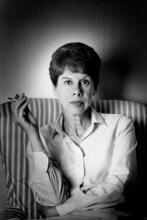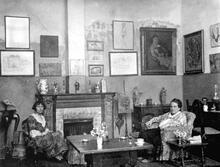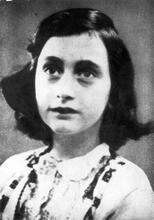Ruth Prawer Jhabvala
Writer Ruth Prawer Jhabvala and William Phillips at a 1962 PEN meeting in New Delhi.
Courtesy of Wikimedia Commons
Born in Cologne, Germany, in 1927, Ruth Prawer Jhabvala and her family emigrated to England in 1939. From 1951 to 1975, Jhabvala lived in India; in 1975, she moved to New York City, where she lived until her death in 2013. She is known for her long collaboration with Merchant Ivory Productions, in which Jhabvala wrote scripts and screenplays for director James Ivory and producer Ismail Merchant. She won her first Academy Award for her screenplay for A Room with a View (1986) and won her second Oscar in the same category for Howards End (1992). Her awards include the Booker Prize for Heat and Dust (1975), a Guggenheim Fellowship (1976), a Neil Gunn International Fellowship (1978), and a MacArthur Fellowship (1984).
Jewish Identity
To many of her readers, Ruth Prawer Jhabvala is equated with the silks and spices of Heat and Dust (1975). In appending her husband’s even more exotic name, she was able to overshadow her own alien origins; her Jewish descent is a surprisingly little known fact, especially in India, where it is enough that she is a westerner in Delhi, presuming to comment on Indian country and culture. Nevertheless, perhaps by its very absence, it is central to her writing.
Personal Life and Family
Ruth Prawer Jhabvala was born on May 7, 1927, in Cologne, to a Polish-born father and German-born mother. Her brother, Siegbert (b. 1925), studied at Cambridge University and later became a professor of German literature at Oxford University. The family emigrated to Britain in 1939 and attained British citizenship in 1948. After completing schooling at Hendon County School in London in 1945, Ruth Prawer attended Queen Mary College, London, where she received first a BA degree and then an MA in English literature (1951). She married Cyrus Jhabvala in 1951. The couple had three daughters. From 1951 until 1975 she lived in India; she moved to New York City in 1975 and later held dual British/American citizenship. Her awards include the Booker Prize for Heat and Dust (1975), a Guggenheim Fellowship (1976), a Neil Gunn International Fellowship (1978), and a MacArthur Fellowship (1984).
Immigration to England from Nazi Germany
Jhabvala was, in her own words, “practically born a displaced person” (Gooneratne). In the spring of 1939, when she was twelve years old, she and her family were among the last to escape from Nazi Germany to England. In all, they lost some forty relatives in the Holocaust, and many more besides: “My father’s entire family, part of my mother’s family, the children I went to school with, and most of my parents’ family friends—in fact, our entire social circle.”
Jhabvala seldom spoke of this or of her childhood, but in a rare public lecture, given in 1979, she said of the years 1933–1936:
They should have been my most formative years, and maybe they were, I don’t know Together with the early happy German-Jewish bourgeois family years 1927–1933—they should be that profound well of memory and experience (childhood and ancestral) from which as a writer I should have drawn. I never have…. I don’t know why not. I do know that they were the beginning of my disinheritance—the way they are for other writers of their inheritance.
While she did not write directly about this “moment of disinheritance,” her work set in the West was peopled by German-Jewish characters who lead dislocated, albeit comfortable existences, far from home. Of these, “A Birthday in London” perhaps comes closest to describing Jhabvala’s own adolescent years in England. In this work, Sonia Wolff, a widowed German-Jewish emigrée, hosts a birthday party. As dusk falls, she and her friends sit over apfel strudel and coffee and try not to talk about the old times. It is a melancholy but spirited gathering. At one point Sonia’s son Werner breezes in, but while he is fully at ease in London, for his mother and her friends it has not been easy to start over in a country where no one knows your name or what it stood for. As Mrs. Gottlob bravely reflects: “‘Yes, there we were all different people. … Still, here we all are, no bones broken, eh, Lumbik?’” Like Bruno in In Search of Love and Beauty, Sonia’s husband Otto has simply wasted away. (Jhabvala’s father committed suicide in London in the 1950s.)
Literary Career in India
Jhabvala’s passage to India was an inversion of the immigrant’s move from east to west, but while the country’s poverty and corruption rankled with her sense of social justice (India remained for her a “great animal of poverty and backwardness” as she explained in “Myself in India”), she found life there “much closer to the Jewish world I knew than the Anglo-Saxon world,” and came across very Jewish attitudes towards, for example, the ritual of food, which often features in her writing. But even by marriage Jhabvala was an outsider, since her husband was a Parse, a member of a generally well-educated and prosperous ethnic group whose position in Indian society is not dissimilar to that of the Jews in Europe. While Sonia and her friends drink strong coffee in continental cafes and sit in dark apartments full of heavy furniture, their children ponder their disinheritance. In In Search of Love and Beauty, Bruno’s daughter Marianna adopts a Jewish baby, Natasha, in an attempt to tune into her heritage. But Natasha, with her “pale ghetto complexion, her dark inward-looking eyes,” is not what she expects, and it turns out that Marianna has confused her image of a Jewish child with that of a Russian one. Later in the novel, Marianna’s son, Tim, takes up his own search for the WASP landscape he feels he should rightfully have inherited from the father he barely knew.
In “Myself in India” Jhabvala wrote, “I’m absolutely passive, like blotting paper,” explaining elsewhere: “Not really having a world of my own, I made up for my disinheritance by absorbing the worlds of others.” Just as she captured the Anglo-Indian experience so comprehensively in Heat and Dust, so her many successful screenplays, including Howards End and A Room with a View, written for Merchant-Ivory (both of which won Academy Awards), evoke an England more English than ever it was. Her characters are often animated by a desire to absorb and appropriate the better qualities of others. In In Search of Love and Beauty, Leo Kellerman, typical of Jhabvala’s messianic male figures, draws a harem of searchers in his wake, while Boy in “A Summer by the Sea” exercises a similar, albeit less manipulative, fascination over both men and women, and in “Great Expectations,” a career woman’s careful, solitary life is turned upside down by a golden-haired, fairy-like trio.
Life in New York
As one who espoused James Joyce’s view that writing is all about “silence, exile and cunning,” Jhabvala’s disinheritance was as productive as any inheritance. To quote Yasmine Gooneratne, hers are “novels of expatriation” in all its various guises: national, cultural, emotional, familial. Her multiple exile left her with an ambivalent identity: early blurbs described her as a Polish writer; she as a Westerner in the East, and an Easterner in the West; and just when we might have got the measure of her, she added another layer to her camouflage by moving back west to spend half her time in New York, a transition she chronicled in East into Upper East. Significantly, her My Nine Lives: Chapters of a Possible Past (2004) is a semi-autobiographical novel that sets out a series of nine alternative life stories, each of which the author feels she could have lived.
Death and Literary Legacy
In a personal letter written in 1991, Jhabvala claimed to be able to trace no influence of her Jewish background in herself or her writing, but for the informed reader an unmistakably Jewish sensibility shines through—in her social conscience, in her characters’ constant questing for spiritual and emotional enlightenment, in the compassion and pathos that flesh out her otherwise crisp, Austenesque prose. After all, silence, cunning, and exile are, as Gooneratne points out, not so far removed from “silence, omission, and the wish to forget”—sadly, more Jewish precepts altogether.
In 2013, Ruth Prawer Jhabvala died in New York City at the age of 85.
Selected Works by Ruth Prawer Jhabvala
Fiction
To Whom She Will (1955; as Amrita, 1956).
The Nature of Passion (1956).
Esmond in India (1958).
The Householder (1960).
Get Ready for Battle (1962).
Like Birds, Like Fishes and Other Stories (1963).
A Backward Place (1965).
A Stronger Climate: Nine Stories (1968).
An Experience of India (1971).
A New Dominion (1972; as Travelers, 1973).
Heat and Dust (1975).
How I Became a Holy Mother and Other Stories (1976).
In Search of Love and Beauty (1983.
Out of India: Selected Stories (1986).
Three Continents (1987).
Poet and Dancer (1993).
Shards of Memory (1995).
East into Upper East: Plain Tales from New York and New Delhi (1998).
My Nine Lives: Chapters of a Possible Past (2004).
Plays
Shakespeare Wallah: A Film, with James Ivory (1973).
Autobiography of a Princess, Also Being the Adventures of an American Film Director in the Land of the Maharajas, with James Ivory and John Swope (1975).
Screenplays
The Householder (1963).
Shakespeare Wallah, with James Ivory (1965).
The Guru (1966).
The Bombay Talkie (1970).
Autobiography of a Princess, with James Ivory and John Swope (1975).
Hullabaloo over Georgie and Bonnie’s Pictures (1977).
Roseland (1977).
The Europeans (1979).
A Call from the East (1981).
Quartet (1981).
Heat and Dust, with Saeed Jaffrey and Harish Khare (1983).
The Bostonians (1984).
A Room with a View (1985).
Madame Sousatzka, with John Schlesinger (1988).
Howards End (1992).
The Remains of the Day (1993).
Jefferson in Paris (1995).
Other
Meet Yourself at the Doctor (1949).
Agarwal, Ramlal G. Ruth Prawer Jhabvala: A Study of Her Fiction. New York: 1990.
Bailur, Jayanti. Ruth Prawer Jhabvala: Fiction and Film. New Delhi: 1992.
Chakravarti, Aruna. Ruth Prawer Jhabvala: A Study in Empathy and Exile. New Delhi: 1998.
Crane, Ralph J. Ruth Prawer Jhabvala. New York: 1992.
Gooneratne, Yasmine. Silence, Exile and Cunning: The Fiction of Ruth Prawer Jhabvala. New Delhi: 1983.
Shahane, Vasant Anant. Ruth Prawer Jhabvala. New Delhi: 1976.
Shepherd, Ronald. Ruth Prawer Jhabvala in India: The Jewish Connection. New Delhi: 1994.
Sucher, Laurie. The Fiction of Ruth Prawer Jhabvala. New York and London: 1989.
From Jewish Writers of the Twentieth Century. Editor: Sorrel Kerbel. Copyright © 2003. Reproduced by permission of Routledge/Taylor and Francis Books, Inc.













